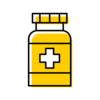Main navigation
Our mission
The mission of the Department of Chemical and Biochemical Engineering is to serve Iowa, the nation, and the world by graduating talented and well-rounded chemical and biochemical engineers possessing the tools and capabilities to become technology and business leaders, and through excellence in research and scholarship that advances sustainable technologies.

Undergraduate information
I. Preface from the Chair
II. Program Overview
Chemical Engineering Program Objectives
The Chemical Engineering Program at the University of Iowa produces graduates with a strong foundation of scientific and technical knowledge who are equipped with problem solving, teamwork, and communication skills that will serve them throughout their careers consistent with the following Educational Objectives. Within a few years following graduation, our graduates will:
Attain careers as practicing chemical engineers in fields such as biomedical, biotechnology, chemical products, climate solutions, computation, energy, environmental engineering, food processing, pharmaceuticals, polymers/advanced materials, or semiconductors;
Pursue advanced studies in disciplines such as Business, Chemical Engineering, Computation, Dentistry, Environmental Engineering, Law, Medicine, or Pharmaceuticals; and
Assume professional leadership roles.
The following methods and strategies are used in the Chemical Engineering undergraduate program to achieve these Program Educational Objectives:
Foster a unique and personalized undergraduate experience by leveraging the advantages of a small college atmosphere within a comprehensive liberal art and research university;
Provide a respectful and safe environment for all students;
Enrich the undergraduate experience through cultural diversity, international opportunities, and/or experiential learning;
Provide a solid foundation and understanding of the fundamental principles of mathematics, science, and engineering;
Provide students with experience in learning and applying tools, and analyzing and interpreting data to solve theoretical and open-ended chemical engineering problems;
Provide students with opportunities to participate in collaborative teams;
Develop students’ written and oral communication skills to a wide range of audiences;
Provide students with opportunities to design and conduct chemical engineering experiments and to design systems, components, and chemical processes to meet specific needs and constraints;
Provide a contemporary grounding in ethical and professional responsibility, including global, economic, environmental, safety and societal impacts of engineering decisions; and
Instill the desire and the understanding of the need for lifelong learning.
The program educational objectives (PEOs) and the strategies used are published on the Chemical and Biochemical Engineering web site and in The University of Iowa's General Catalog.
Chemical Engineering Student Outcomes
The Chemical Engineering Student Outcomes are characteristics that a successful chemical engineer should have at the time of graduation. These outcomes are patterned after the basic requirements identified by the engineering accreditation board (ABET) and the AIChE Program Criteria, and are listed below.
- Each graduate will have the ability to apply knowledge of mathematics, science and engineering fundamentals.
- Each graduate will have the ability to design and conduct experiments, and to analyze and interpret experimental results.
- Each graduate will have the ability to design systems, components, or processes to meet specified objectives within realistic constraints such as economic, environmental, social, political, ethical, health and safety, manufacturability, and sustainability in chemical engineering.
- Each graduate will have the ability to work as a member of multidisciplinary teams, and have an understanding of team leadership
- Each graduate will have the ability to identify, formulate, and solve chemical engineering problems.(1)
- Each graduate will have an understanding of professional and ethical responsibility.
- Each graduate will have the ability to communicate effectively in written, oral, and graphical forms.
- Each graduate will have an education that is supportive of a broad awareness of the world and its cultures, and that provides an understanding of the impact of engineering practice in the global, economic, environmental, and societal context.
- Each graduate will recognize the need for and have the ability to engage in lifelong learning.
- Each graduate will have knowledge of contemporary issues.
- Each graduate will have the ability to use the techniques, skills and modern engineering tools necessary for engineering practice.
- Each graduate will have a thorough grounding in chemistry and a working knowledge of advanced chemistry, including organic and physical and either inorganic or analytical, depending upon their individual educational goals.
- Each graduate will have a working knowledge of chemical process safety.
- Each graduate will have a working knowledge of biochemical engineering.
(1) As an integral aspect of this outcome, each graduate will demonstrate a working knowledge, including safety and environmental aspects, of material and energy balances applied to chemical processes; thermodynamics of physical and chemical equilibria; heat, mass, and momentum transport; chemical reaction engineering; continuous and stage wise separation operations; process dynamics and control; and chemical engineering design.
III. Advising
Advising Information
In the summer proceeding their first semester and during the first semester, incoming engineering students are advised by the Student Development Center staff. In the second semester, those students who have declared a major program are assigned a faculty advisor from that program. Engineering students who remain undeclared after the first semester are advised either by the Associate Dean for Academic Programs or the Student Development Center staff until they declare a major, at which time they are assigned a faculty advisor from their major program. For students who change majors, the Student Development Center assigns them a new faculty advisor from their new major program, matching student and faculty sub-discipline interests where appropriate.
In the Chemical Engineering Program, the primary mission of the advising program is to help you develop and pursue an individualized academic program that will maximize your professional growth and development based upon your career goals. For this reason, advising is done by tenured or tenure-track faculty, and you are required to meet with your advisor each semester to review progress toward your degree, discuss course selections, receive a computer registration number for pre-registration for the upcoming semester, and discuss your overall career goals.
Your academic advisor serves as an important resource by being available to explain the overall Chemical Engineering curriculum, which is laid out as a four-year plan in the section below. Based upon your unique capabilities, constraints, and career plans, your advisor will make curricular recommendations designed to maximize your professional development while you successfully complete the curriculum. Be sure to ask your advisor about the potential role of co-operative educational experiences or study-abroad opportunities in your professional development.
In addition to your academic advisor, you may find the Student Ambassadors to be useful (their office is located in 3124 Seamans Center). Student Ambassadors are available for "pre-advising" before you actually see your academic advisor. You can go to the Student Ambassadors office for curriculum sheets, questions about requirements, etc. Student Ambassadors are junior and senior students in the College of Engineering.
CBE Undergraduate Students Resources & Forms
IV. Curriculum
Graduation Requirements
The requirements for receiving a B. S. degree in Chemical Engineering are the following:
Successfully complete the required courses and an accepted Focus Area (see below);
Maintain a GPA of 2.0;
Complete an accepted enriching activity (see below).
The undergraduate program requires 128 semester hours of course work for graduation (129 semester hours for the Pre-med Focus Area). These courses are in the areas of mathematics, chemistry, general engineering, chemical engineering, and the general education component (GEC). Two semesters of calculus and one semester each of differential equations, matrix algebra, and probability and statistics satisfy the mathematics requirement. General and organic chemistry courses are required, with a lecture and lab portion for each area. In addition, an advanced chemical science sequence, including lecture and lab courses, consistent with the student's Focus Area, is also required. Starting Summer 2015, students admitted to the College of Engineering must fulfill the following GEC course policy:
- Every student must take a minimum of 15 SH of GEC courses.
- Among the 15 SH, 3 SH must be from the pool of courses designated as Engineering Be Creative courses.
- Among the 15 SH, 3 SH from the pool of courses designated as CLAS General Education Courses.
- Among the 15 SH, 9 SH from the list of Approved Course Subjects
The general engineering courses include statics, electrical circuits, thermodynamics, materials science, and computational methods. The chemical engineering courses are taken during the sophomore, junior and senior years. Chemical kinetics, thermodynamics, momentum transport, heat and mass transfer, economics, process control, design, and safety are covered in these classes. Focus Areas (see below) give the student an opportunity to explore an area of personal interest.
Four-year Curriculum Guides
The four-year curriculum guides are listed below. There is a Majors sequence and a Standard sequence.
The recommended four-year plan contains the Organics for Majors sequence, which generally allows for smaller class sizes and greater access to lab equipment. However, if chemical engineering students switch to another engineering major, then the organic chemistry course taken during the first semester of the second year may not count towards the requirements of the new engineering major. The other four-year plan contains the Standard Organic Chemistry sequence, and all coursework taken through the first three semesters will satisfy other engineering departmental requirements.
Use the guides below to plan your undergraduate coursework and complete a plan of study worksheet:
Focus Areas
The inclusion of Focus Areas (FAs) in the Chemical Engineering curriculum provides you with the opportunity to gain depth of knowledge in your chosen career path in addition to the strong fundamental grounding in the scientific, engineering, and chemical engineering principles provided by the common curriculum.
As described below, you may choose a pre-approved FA in the following topics.

Biochemical Engineering
This FA allows students to choose from a selection of courses that combines concepts of biology, biochemistry, and engineering. Biochemical engineers combine knowledge of these three areas to manufacture products of biological nature, including fermentation products and pharmaceuticals. Students who complete this FA often go on to work in the biotechnology and pharmaceutical industries as production leaders or researchers.
Biochemical Engineering FA Form

Business
The business FA consists of eight core courses within the Tippie College of Business. Students who choose this path gain foundational business knowledge on topics including finance, economics, accounting, marketing, law, and management. Successful fulfillment of all requirements results in a minor in business, which provides students with skills to build and run successful businesses. Past business FA students have applied their integrated business and technical knowledge to many different settings ranging from manufacturing plants to consulting and to corporate offices.

Chemical Process Engineering
Process engineering is the design, optimization, and operation of systems that transform raw materials into valuable products. Products that process engineers are involved with include foods and beverages, electronic materials, metals, plastics, fuels, building materials, and pharmaceutics. As this topic spans many aspects of engineering, business, applied math, and science, students who pursue the chemical process engineering FA have the freedom to choose 12 semester hours of electives from a broad selection of 3000-level engineering, math, and science courses. This FA provides ample room for customization and opportunities to tailor to individualized interests. Students who do not declare a different FA are automatically placed into chemical process engineering.
Chemical Process Engineering FA Form

Computation, Data Science, and Machine Learning
The Computation, Data Science, and Machine Learning FA is made for students who intend to blend advanced computation and programming with their chemical engineering degree. This program is customizable based on student interest areas, and can accommodate introductory training in cyber-physical systems, remote sensing, advanced simulation, supply chain management, in silico chemistry and biology, bioinformatics, software design, next-generation controls, machine learning, and artificial intelligence. This FA leverages a wide and growing range of new course offerings across the college and University.
Computation, Data Science, and Machine Learning FA Form

Custom
The Custom FA is a personalized option recommended for students whose career goals and interests are not consistent with any of the preexisting FA plans. For this FA students work with their academic advisor to develop a course plan.

Energy and Environment
Students who are passionate about the environment should consider this path. Courses prepare students to solve environmental challenges and to revolutionize energy systems. Topics include air pollution, climate change, clean and renewable energy, environmental regulations, and sustainable systems. This FA features the Green Chemical and Energy Technologies course that covers topics including solar energy conversion, life cycle analysis, greenhouse gas accounting, and biofuels.
Energy and Environment FA Form

Entrepreneurship
Interested in new businesses and new products? The entrepreneurial FA allows students to focus on the process of succeeding in the world of startups, innovation, business ownership, and new products. This FA is also designed to dovetail with the College’s certificate in technological entrepreneurship. The entrepreneurship elective focus area is well suited for students who intend to start and operate their own business; it also serves students interested in gaining a better understanding of managing innovation in an existing business environment. The wide range of electives permits students to tailor business courses best suited to their individual interests.

Oil and Gas Engineering
Meant for students interested in pursuing careers in oil and gas engineering, this FA explores foundational elements of chemistry, geology, petrochemical refining, and environmental science. The course plan offers several recommendations put in place by experienced advisors with petrochemical backgrounds. Often viewed as the birth of chemical engineering, the petroleum industry provides a host of challenging and lucrative opportunities for chemical engineers. This path provides a unique and focused introduction to the field.
Oil and Gas Engineering FA Form

Pharmaceuticals
Chemical and biochemical engineering is central to the design, formulation, and manufacturing of pharmaceutical products. Students who are passionate about medical applications can align their chemical engineering skills toward a career in pharmaceuticals by choosing this FA. The curriculum features biology, drug delivery, and the mechanisms and chemistry of drug interactions. Course options span many departments in addition to CBE, including biomedical engineering, biochemistry, pharmacy, and pharmacology.

Polymers
The polymers elective focus area enables students to study the development of chemical compounds by polymerization, i.e., combining small molecules into engineered networks to produce valuable plastics and other advanced materials. This program is well suited for students who intend to use their knowledge to design new materials; it also serves students interested in gaining a better understanding of the links between molecular scale structure and macroscopic scale properties. Many students in this FA take an advanced chemistry course resulting in a chemistry minor.

Pre-Medicine
Concepts of chemical engineering are naturally applicable to the processes in living organisms. The Pre-Medicine elective focus area enables students to apply these concepts to gain a deeper understanding of the atoms and molecules that comprise living organisms, and the pathways through which they operate. This program is well suited for students who intend to use their knowledge to gain acceptance to post-graduate education in the medical field.

Safety & Health
The Safety & Health FA prepares students to (i) prevent incidents and accidents in chemical and pharmaceutical manufacturing, particularly those resulting from the unintentional release of hazardous materials and energy into the environment, and (ii) provide a safe and healthy workplace by preventing injuries and hazards in the workplace environment.

Sustainability
The sustainability FA covers the most important and current topics in environmental science, societal impacts, energy usage, and natural systems. Courses prepare students to understand and discuss these topics as they relate to chemical engineering. The sustainability FA is designed for students pursuing the University-wide certificate in sustainability along with an engineering degree.
You must select a Focus Area in the third semester (first semester of sophomore standing). You must meet with your faculty advisor to develop and submit an electronic FA Application Form and a plan of study worksheet prior to enrolling in the first FA course. When completing the semester-by-semester plan, it is important to note that some of the elective courses are not offered every year. To aid in planning, the recurring schedule of CBE electives is published on the CBE web page. All students who have not completed the FA paperwork by the end of the Sophomore year (first semester of Junior standing) will be automatically placed in the Chemical Process Engineering FA. Changes to the FA track can be made by completing the FA application process.
Alternatively, you may choose to develop your own FA consistent with your career goals subject to approval by the Chemical Engineering Curriculum Committee. The Chemical Engineering Program has developed the following guidelines for the FAs after careful consideration of the required elements for a chemical engineering degree (including the advanced chemistry requirement and the other program requirements specified by the American Institute of Chemical Engineers).
| Course(s) | s.h. |
|---|---|
| General education component (GEC) courses | 15 s.h. |
| Statistics elective | 3 s.h. |
| Advanced chemical science electives | 6 s.h. |
| Free electives | 12 s.h. |
| Total Semester Hours | 39 s.h. |
| Required Advanced Chemical Science Electives* | Examples of Acceptable Courses | Examples of Unacceptable Courses |
|---|---|---|
3 s.h. of an advanced chemistry course. Courses must be 3000 level or above and from Chemistry (CHEM) or Biochemistry (BIOC). | CHEM:3110 Equilibria & Electrochemistry FALL CHEM:3120 Spectroscopy and Separations SPRING CHEM:3430 Analytical measurements SPRING CHEM:4430 Principles of Physical Chemistry FALL CHEM:4431 Chemical Thermodynamics FALL/SPRING CHEM:4432 Quantum Mechanics and Chemical Kinetics FALL/SPRING CHEM:3440 Physical Measurements FALL BMB:3110/3120/3140 Biochemistry FALL/SPRING | Biology: BIOL:1411/1412 Physics: PHYS:1612 |
| 3 s.h. of an advanced science course. Science-based courses may be offered within the College of Engineering or by science departments outside the College of Engineering. | Any of the Advanced Chemistry courses (see above). BME:2400 Cell Biology for engineers FALL/SPRING,
CBE:4420 Environmental Chemistry FALL,
OEH:4240 Global Environmental Health FALL/SPRING OEH:6710 Human Toxicology and Risk Assessment SPRING
PCOL:2220 Drug Use and Abuse SPRING PCOL 3102 Pharmacology I: A drug’s fantastic journey count for an advance science FALL
PHYS:3730 Statistical Physics FALL PHYS:3741 Introduction to Quantum Mechanics FALL |
CBE:5210 Bioseparations CBE:5310 Polymer Science and Technology CBE:5405 Green Chemical and Energy Technologies CBE:5410 Electrochemical Engineering (Courses used to satisfy the engineering elective requirement in EFA plans.) |
* Students completing one 3 s.h. advanced CHEM course qualify for a minor in Chemistry. The minor is obtained by indicating the request on MyUI (Student Records > Courses & Grades > Minors) before the second to last semester.
| Course no. | Course title | s.h. |
|---|---|---|
| STAT:2020 | Probability and Statistics for Engineering & Physical Science | 3 s.h. |
| STAT:3510 | Biostatistics | 3 s.h. |
| CBE:3020 | Statistics for Chemical and Environmental Engineering | 3 s.h. |
Recurring Schedule of CBE Electives
Fall of Even Years
CBE:5152 Transport Phenomena I
CBE:5315 Polymer Chemistry
Fall of Odd Years
CBE:5310 Polymer Science and Technology
Spring of Even Years
CBE:5110 Intermediate Thermodynamics
CBE:5210 Bioseparations
CBE:5425 Atmospheric Chemistry and Physics
Spring of Odd Years
CBE:5405 Green Chemical and Energy Technologies
Required Enriching Activities
Chemical engineers in the workplace inevitably work in multidisciplinary teams, and are frequently working on projects that impact society both locally and globally. Therefore, our program will provide enriching activities to enable each student to develop effective multidisciplinary team skills and to develop an understanding of the impact of chemical engineering practice on both the micro and macro scales. All Chemical Engineering students will complete at least one of the following enriching activities as a requirement to receive a BS degree:
- Cooperative education experience
- Three semester hour equivalent of an approved research experience
- Internship experience
- Study abroad
- Entrepreneurial program (i.e., receive the corresponding certificate)
- Other approved multidisciplinary experience*
Completion of any of these activities will require that the student briefly summarize (~250 words) the contribution of their experience to the development of multidisciplinary team skills and to the increased understanding of the impact of engineering practice both locally and globally. While enriching activities can be completed at any point during the undergraduate career, students will register for 052:092 (CBE:4195) Enriching Activities Seminar during their senior and fulfill the reporting requirement.
Common Minors
Chemical Engineering undergraduate students may obtain minors in several disciplines automatically or by taking one or two extra courses. Students must sign up for these minors in MyUI (myui.uiowa.edu) under Student Records—Courses & Grades—Minors. Students with credits at other colleges and/or universities and students with AP credits should contact the respective departments to ensure that those transfer credits will count towards the minor. Common minors obtained by Chemical Engineering students are listed below:
- Minor in Business: Students obtain this minor automatically by completing all courses listed in the Business FA.
- Minor in Chemistry: Students obtain this minor automatically by completing either the Analytical Chemistry or Physical Chemistry advanced chemistry sequence.
- Minor in Mathematics: Students obtain this minor by completing two advanced mathematics courses beyond those required in the curriculum. For instance, students can take MATH:4120 —History of Mathematics (however, MATH:4120 will NOT count as your approved GEC) and MATH:3550 —Engineering Math V: Vector Calculus.
BS/MS Programs
V. Professional Development Opportunities
Hanson Center for Communication
The Hanson Center for Communication (HCC), which is located in 4650 Seamans Center, was established to aid and teach engineers-in-training to communicate professionally across a range of genres-from proposals to project reports and from Power Point slides to lab reports. The HCC has helped the faculty to integrate discipline-specific writing projects and speaking exercises into all six Engineering departments. Writing experts and peer consultants are available Monday-Thursday afternoons by appointment or walk-in. The HCC also has a web page where useful information regarding proper referencing and citations, as well as tips and strategies for technical writing are available.
Cooperative Education
The Cooperative Education program, administered through Engineering Career Services, gives students the option of exploring and developing their careers through periods of professional practice. Experiential education provides the engineering student hands-on, institutionally supervised, engineering related experience in business, industry, education or government. Not only will the experiences enhance the likelihood of finding a job after graduation, but it will also allow students an opportunity to practice the methods and principles they are learning in their classes and the chance to gain confidence as a professional. All students in the College of Engineering are eligible to participate in the co-op and internship program upon completion of one full semester in the College. Undergraduates seeking this option must have at least a cumulative GPA of 2.0. Qualified students may elect alternating periods of on-campus study with full-time work experience or may elect half-time work experience while taking at least 6 semester hours of classes. The experience can cover one to three semesters, a series of summers or a single summer. Academic record and class status are considered prior to acceptance into the program. The Co-op/Internship program recommends that students begin their search early so that they may get co-op or internship experience starting the summer after their freshman or sophomore year. If you are interested in learning more about the co-op program, contact Kalindi Garvin, Engineering Career Services, Engineering Student Success Team (3612 Seamans Center or 319-335-5763). Additional information is available here.
Engineering Career Services
Engineering Career Services, located in the Student Development Center (3612 Seamans Center), is a comprehensive organization comprised of experiential education and career development. Engineering Career Services helps students in the College of Engineering—first year through graduate— acquire skills which will allow them to choose and attain personally rewarding careers, through exploration of experiential education and the development of job search skills. Peer Advisors are available to assist students with resume and cover letter critiques, job and internship search strategies, interviewing skills, offer evaluation and negotiation and study abroad opportunities. In addition, Engineering Career Services works to foster relationships with potential employers and hosts two annual Engineering Career Fairs.
Omega Chi Epsilon
The Chemical Engineering honor society at Iowa recognizes outstanding scholarship at the undergraduate level. Omega Chi Epsilon is active in undergraduate tutoring, sponsoring student-faculty activities, and in administering outstanding student and teacher awards. Juniors with a GPA of 3.25 and seniors with a 3.0 are eligible for acceptance into the honor society.
Other Engineering Professional Societies and Student Organizations
The College of Engineering at The University of Iowa offers many societies and organizations for students interested in becoming more involved. A brief description of each organization can be found at http://www.engineering.uiowa.edu/current-students/student-organizations. Additional information about each organization, including deadlines for enrollment, can be obtained by sending a short email to addresses provided.
· Engineering Student Council: council@engineering.uiowa.edu
· Society of Hispanic Professional Engineers (SHPE): shpe@engineering.uiowa.edu
· Society of Women Engineers (SWE): swe@engineering.uiowa.edu
· Tau Beta Pi: tbp@engineering.uiowa.edu
· Theta Tau Fraternity: omicron@engineering.uiowa.edu
Research and Teaching Opportunities
The department offers a variety of undergraduate research opportunities, either for credit or for pay. If you are interested in conducting academic research, then contact the faculty members with whom you would like to work and give them a copy of your resume. In addition, there may be opportunities for juniors and seniors to serve as teaching assistants for Chemical Engineering courses. If you are interested, then contact the department chair.
VII. Student Opportunities
Other Opportunities
Record Your Co-op
- Let Us Know You're Doing A Co-op this form will notify the CBE department of your opportunity.
To sign up for the co-op/internship course, students need to complete the workflow form found on the Cooperative Education & Internship Program Page: To register your co-op or internship please complete this form.
Enrollment and advising resources
Enrollment changes
Graduating students
Department rules and regulations
Mentor/tutor opportunities
Curriculum
Seminars and AlChe Student Chapter
The Chemical and Biochemical Engineering Department Seminar 52:090 (CBE:1000) for first-year students is held weekly during the Spring semester. This seminar is designed to introduce students to the chemical engineering profession and the Department of Chemical and Biochemical Engineering at The University of Iowa.
The Chemical and Biochemical Engineering Professional Seminar 52:091 (CBE:3000) is held weekly during the Fall and Spring semesters. Four semesters of this seminar are required for graduation and usually begins in the Spring semester of the Sophomore year. This seminar also serves as The University of Iowa's student chapter of the American Institute of Chemical Engineers (AIChE). Speakers from industry and academia are invited to speak at the seminar. Students are strongly encouraged to attend Regional and National AIChE meetings. In order to receive credit for the seminar, the student must do all of the following every semester:
· Pay $5 in dues
· Attend every scheduled seminar
· Become a national AIChE member (http://www.aiche.org/community/membership)
· Attend Professional Enhancement Activity and submit a summary*
*In support of enhancing our students' awareness of the world and its cultures (see Program Outcome (h)) and their knowledge of contemporary issues (see Program Outcome (j)), each student will be required to participate in one Professional Enhancement Activity consistent with these outcomes during the semester. The student will be required to write a 50 to 100 word summary of the activity and how it contributed to Program Outcome(s) (h) and/or (j). Possible activities include attendance at (i) an appropriate activity at Hancher, (ii) a seminar in a department outside the College of Engineering, (iii) an appropriate University Lecture, and (iv) a reading at Prairie Lights Bookstore.
Four-year plans
Focus areas (FA)
Scholarship and TA opportunities
Scholarships
Teaching assistant applications
Applications are sent via email at appropriate times near student registration. If you have questions about this process, please contact the director of undergraduate studies.